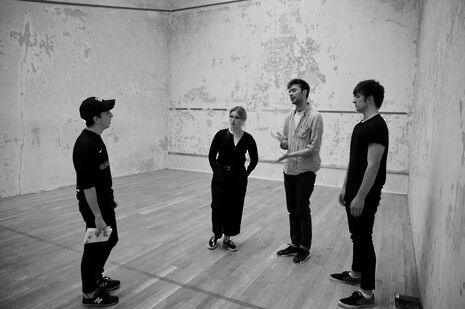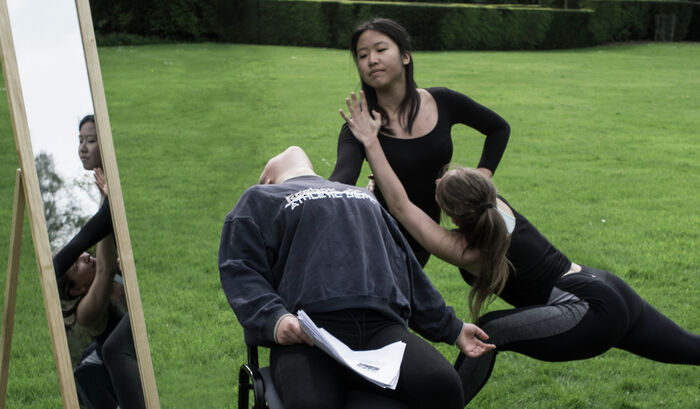Hamlet preview: ‘performing in a free space’
Rehearsed in an old cellar and performed in a church, the first show of the ADC on tour explores the magic of theatre in the round

“To be or not to be, that is the question.” It’s not only the question; it’s what you came for. It’s the moment you’ve been waiting for since you bought your ticket for this play. Hamlet’s glory moment, in the centre of the stage, proclaiming his desperate agony in a spotlight.
But for the company of this production, that’s not it at all. This is a play, they tell me, most of all about relationships, about the way in which Hamlet is crafted by the people around him into the character we think we know so well. This show is, for example, far from Tom Hiddleston’s performance of the famous speech. That was isolated, almost like an audition-piece. This is about all the people who bring Hamlet to say those famous words.
“In the round there is a sense of a separate world which contains only audience and actors, the stage cut off from everything else”
The Round Church is key to this. Everyone on stage can always be seen by somebody in the audience. There is no hiding behind Hamlet or fading into the background. They are all equally a part of the scene. In the round the audience is up close, not just voyeurs but within the scene themselves, feeling as if the characters are addressing each of them individually. It is the intimacy of this staging which seems to move the cast the most. As Ella Blackburn (Ophelia) tells me, it removes the excessive performativity that can be seen on larger stages; the need to make everything big to really hit the audience. In the round there is a sense of a separate world which contains only audience and actors, the stage cut off from everything else. This Hamlet is a play rehearsed in an old cellar and performed in a semi-underground church, seeming to exist in its own theatrical world outside reality.
It isn’t just about the audience though. You can’t do it for the audience in the round, the actors explain, because not everyone can see you at every moment. You have to do it for the emotions. “Let’s block this scene”, a constant refrain in most productions, is a line Ben Lynn’s actors have never heard. Just as they feel the lines slightly differently each time they speak them, so no two performances will be the same. It is the emotions which guide the play, the actors’ deep understanding of the characters they are playing and the situations they are in which makes them move across the stage. There is no autopilot; they have to engage with the emotion every single time. Performing in the round means performing in a free space, one which thrives on instinctive acting.
Instinct and understanding are at the centre of this play. The emotions which the characters speak of are not elevated and distanced from our own lives, but ones the actors compare over and over to situations and feelings they have experienced. The cast rave about their rehearsal space, the personal stories everyone has shared and the confidence that has been built between them as they have constructed these characters. Just as there is no blocking, there are no pre-planned pauses; the rise and fall of the speeches seems to arise from a place of truth within the actors. The rehearsals are driven not just by repetition of the scene but by detailed group discussion of the feelings of each character at each particular moment, the reasons why they would speak each line, and whether the others on stage would believe them. When you see these actors on stage, you don’t just see Hamlet, Ophelia, and Polonius, but student actors voicing their own emotions through the characters that Shakespeare has drawn.
This rawness of emotion is reflected too in the vision of the scenery and lighting for this production. The stage will be lit by candles which, director Ben Lynn says, are about deconstructing a certain vision of theatre. Too often style is valued over substance, with directors feeling the need to set Shakespeare in another time or place, using an elaborate set and lighting. The candles remove the faff, lighting the scene in a natural way rather than one which feels directorial and controlled. Music, too, forms a large part of this production, and is used not to impose an individual’s vision, but to accentuate what already stands in the script. This is Shakespeare stripped down.
Hamlet is on at The Round Church 1-5 and 7 May
 Features / Are you more yourself at Cambridge or away from it? 27 January 2026
Features / Are you more yourself at Cambridge or away from it? 27 January 2026 News / Vigil held for tenth anniversary of PhD student’s death28 January 2026
News / Vigil held for tenth anniversary of PhD student’s death28 January 2026 Interviews / Lord Leggatt on becoming a Supreme Court Justice21 January 2026
Interviews / Lord Leggatt on becoming a Supreme Court Justice21 January 2026 News / Reform candidate retracts claim of being Cambridge alum 26 January 2026
News / Reform candidate retracts claim of being Cambridge alum 26 January 2026 Comment / How Cambridge Made Me Lose My Faith26 January 2026
Comment / How Cambridge Made Me Lose My Faith26 January 2026










